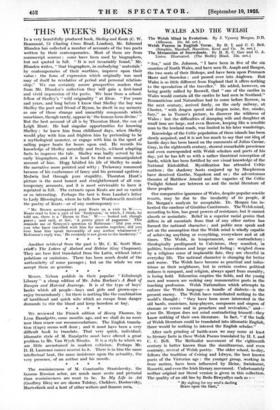THIS WEEK'S BOOKS
IN a very beautifully produced book, Shelley and Keats (C. W. Beaumont, 75 Charing Cross Road, London), Mr. Edmund Blunden hdi collected a number of accounts of the two poets written by their contemporaries. Most of them are from
manuscript sources : some have been used by biographers, but not quoted in full. " It is not invariably found," Mr. Blunden writes, that biographers, in embodying ' materials ' by contemporaries of their worthies, improve upon their value : the form of expression which originally was used may of itself be revelative of period and personal relation- ship." We can certainly assure prospective readers that from Mr. Blunden's collection they will gain a first-hand and vivid impression of the poets. We hear from a school- fellow of Shelley's " wild originality " at Eton. " For years and years, and long before I knew that Shelley the boy was Shelley the poet and friend of Byron, he dwelt in my memory as one of those strange and unearthly compounds which sometimes, though rarely, appear in ` the human form divine.' " But the best account of all is by Thornton Hunt, the son of Leigh Hunt. He had singular opportunities for knowing Shelley : he knew him from childhood days, when Shelley would play with him and frighten him by pretending to be a mythological monster, or engage with him in the sport of sailing paper boats for hours upon end. He records his knowledge of Shelley naturally and freely, without adapting facts to improve the tale. Shelley was badly served by his early biographers, and it is hard to find an unmanipulated account of him. Hogg falsified his life of Shelley to make the narrative more pointed and witty ; Trelawney romanced because of his exuberance of fancy and his personal egotism ; Medwin lied through pure stupidity. Thornton Hunt's picture is the most honest and straightforward of all con- temporary accounts, and it is most serviceable to have it reprinted in full. The extracts upon Keats are not so varied or so interesting. Perhaps the best is from Landor's letter to Lady Blessington, where he tells how Wordsworth received the poetry of Keats—or of any contemporary :-
" Mr. Brown accompanied poor 'Keats on a visit to W—.
Keats read to him a part of his Endyrnion,' in which, I think, he told me, there is a ' Hymn to Pan.' W— looked red, though grave ; and said, at last., ' A pretty piece of paganism.' This reminds me of Kenyon's question to Robinson—' Did you ever, you who have travelled with him for months together, did you ever hear him speak favourably of any author whatsoever ? ' Robinson's reply was, He certainly is not given to the laudatory.' "










































 Previous page
Previous page